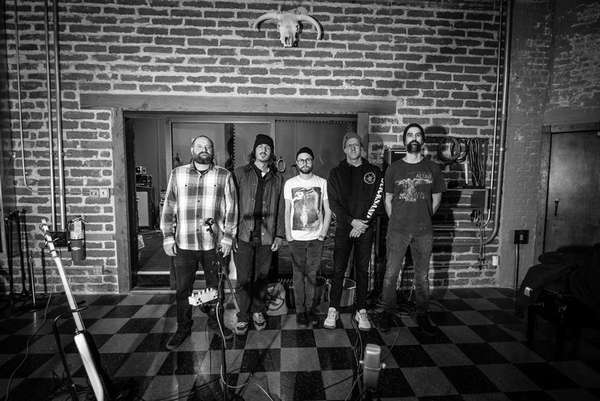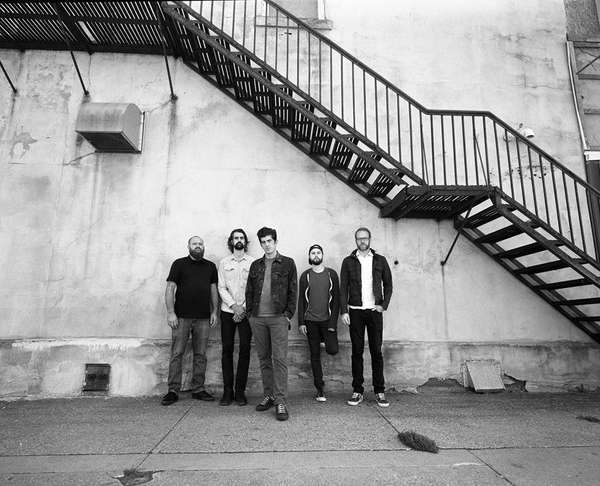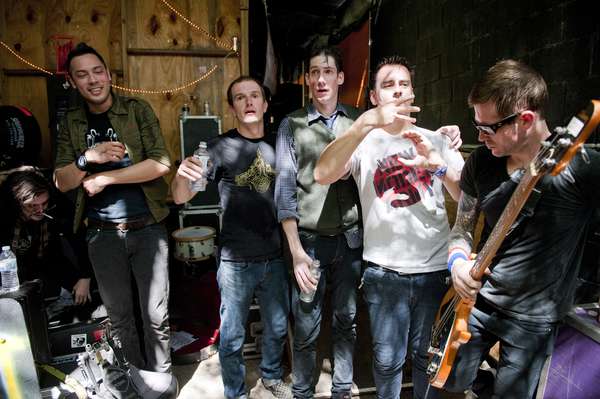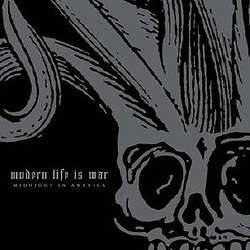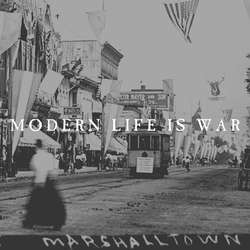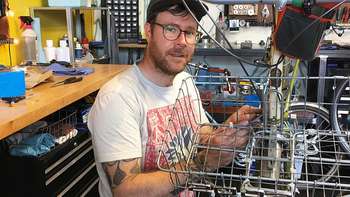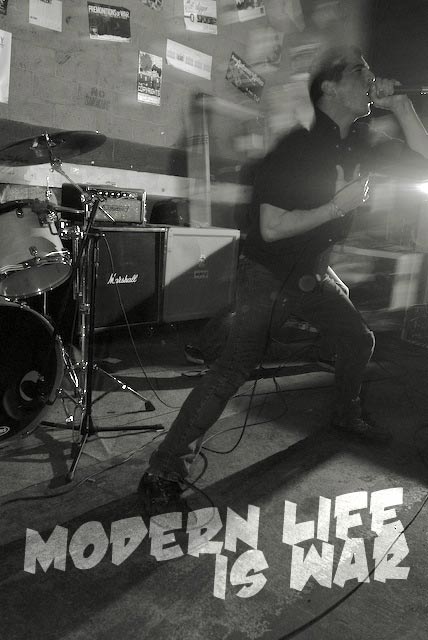
January of two thousand four: I'm weeks away from starting the spring semester of my sophomore year. By the end of February I must declare a major, thus signing a contract that will theoretically determine the rest of my life. Yes, I can change majors; I can even drop out altogether but with each decision comes its own stigma. I was born suburban middle class where it's common to become tracked into a life that leads from school to college to career, something I never wanted but couldn't find an exit from.
Hardcore was the only escape I had but even it couldn't quite articulate my feelings, though neither could I. It had its anger and energy but it was always general, never touching on the specific fears and troubles I had as an American youth.
Bane, the hardcore juggernauts of the time, had a date at the now defunct club CBGB's. As a fan of both the band and punk history I decided to go if only to temporarily forget all the growing up I'd have to do in the coming months. By the evening's midpoint I pace the club back and forth, restless from anticipation and from the responsibility I would have upon returning home. Close to 9:00 PM five gentlemen dressed in black took the stage, collected and humble, while their singer announced, "Hi, we're Modern Life is War."
From that evening I spent the next four years punching holes in walls, driving around rural back roads at 2:00 AM, drinking myself into a stupor, and a myriad of other activities that attempted to help me both hide from and understand the current state of my life. Modern Life is War, a band from rural Iowa, was the soundtrack to those nights. They were a band that said everything I ever felt. I told my friend that's Modern Life is War's sophomore album, Witness, was the album I'd been waiting my whole life to hear.
On April 6th at the Knitting Factory in New York City, Modern Life is War gave their final NYC performance on their final tour as a band. Just prior to the door time, I had dinner with vocalist Jeffery Eaton, discussing everything that led up to their final days as a band.
Scene Point Blank: Okay so you've been out for about a week and half now?
Jeff Eaton: Yeah.
Scene Point Blank: How has it been so far?
Jeff Eaton: It's been really good thus far. I feel like the people who come out care, and the people that lost us somewhere along the way, the ones who decided we're not cool or not their thing or whatever, they didn't. And I want that. I mean there are exceptions but that's all I wanted out of this tour. I wish there was a way to deter people who didn't really care and came just because it's the final shows. There are people who want to see other bands, most of which we tried to hand pick. Some of them we've played with and some are friends of ours. The crowds have been anywhere from forty in Milwaukee to three-hundred-and-thirty tonight in New York. It's kind of all over the place, but it's fun and it's just really good to play without having anything else to worry about. We're not trying to become a bigger band and we're not worried about money or promoting a record and becoming a bigger band. It's just fun to play with nothing in the future; it just feels real pure compared to other tours.
Scene Point Blank: That's always a natural feeling, playing just to play, but there's other things to think about like paying back printing costs and gas and everything else that comes along with touring. I think a lot of fans never take that into consideration.
Jeff Eaton: Exactly, and that's a big part of the reason that we're not going to be a band anymore.
Scene Point Blank: What, thus far, has been a high point of these shows?
Jeff Eaton: The high point of the tour so far was in Detroit. We played refuge skate shop and the PA completely shit out right when we got on. That's the kind of thing that frustrated me because I don't have drums or a guitar or an amp. That's my instrument and that's part of our band and I generally get real pissed off when it happens. So I put the microphone down and yell out, " There's no PA and there's no microphones. Scream every word you know. We're Modern Life is War." All the lyrics were audible because so many people knew the words. It was just awesome. I was circle pitting with people, running around and having fun. It was so free; it was an instance where we knew that this was the difference between Modern Life is War and so much of the other music out there. We can do something like that; there would be bands that would refuse to do it and there are crowds that would refuse to do it. It was just one of those times where we knew that we were something special like we should be. It was amazing.
Scene Point Blank: Bringing it back a little bit, you said that some shows had forty people and some had hundreds. That doesn't sound like it was too different from your normal touring pattern. Do you think kids were coming out specifically for the reason that it was your last tour?
Jeff Eaton: I think they are. I believe the crowds have been a little bigger than normal, maybe not by a long shot, but we definitely had a point where I felt like we were being taken for granted. I understand that because it's hard to get out to a show with money, work, or other obligations. I don't want to complain about that in any way, but at one point I felt like we were touring so much and we'd been around for five years that a lot of people were saying, " I'll see them next time." And if they're worn out or having a bad day maybe they will kind of hang out in the back or something. That didn't offend me but it's hard to deal with. The nice thing about this tour is that it seems like everyone who wants to be there is making an effort to come out. And when they're there, they are very present.
Scene Point Blank: Present in the sense that they're going off more so than other occasions?
Jeff Eaton: Yeah, and they're want to make sure they say hi and tell us the song they want to hear. They want to make sure they tell us what they wanted to tell us, the whole thing. And I like that; I like that sense that people feel like it's important or something. That's what this tour has been.
Scene Point Blank: Going back to the idea of the crowd: another Midwestern band, The Lawrence Arms, said that they may not have a large number of fans, but their crowd is deeply passionate about their band. You feel the same is true for Modern Life is War?
Jeff Eaton: Definitely. I think that's always been a thing with us. I think there was time when I was starting to feel that the emotion was starting to get lost a little bit. I know certain nights will always lack, but I felt it happening more so than before. But I really do feel like that, we've become a band that people really don't care for or really really love.
Scene Point Blank: I noticed that about your band. People either got it or they didn't. They went ape shit or didn't give a shit.
Jeff Eaton: Right, and I understand why we're that kind of band and I love it. I love that about us. I know that all of us as individuals in the band would be really bothered if we were one of those bands who are casual and people would think, "Well they're on this label and they play this kind of music, let's go watch them I guess. They have cool t-shirts; we'll make an appearance." We couldn't have done that; we wouldn't have enjoyed ourselves. I think that as a band we couldn't have written music to do that. We polarized people while we were writing those songs, while we were writing those lyrics.
Scene Point Blank: In another interview you said, "I think there is something that is not quite right about the way Modern Life is War sounds. We weren't purely anything. Different ideas and emotions and identities were always playing tug of war." You can hear that if you listen close enough. You mentioned it frustrated you, perhaps not having a definitive "sound" but wouldn't that almost embody the band perfectly? Were you happy with that sound? It was almost unstable.
Jeff Eaton: That is what is either great or horrible about Modern Life is War. We're not quite right, the records we made and the way they sound. They way the lyrics are written and the way we are as people. Everything. Nothing was ever quite right and we were always trying to get it right. Everyone in the band is so stubborn and no one would give an inch while tugging. That thing in the middle was Modern Life is War and that's what it was.
Scene Point Blank: Were you happy with it?
Jeff Eaton: I'm really happy with it; that's what I love about it. All along I hated it and now I can look at it and appreciate it and say, "Yes, that's why people liked us. That's why we had success and that's why Modern Life is War was what it was."
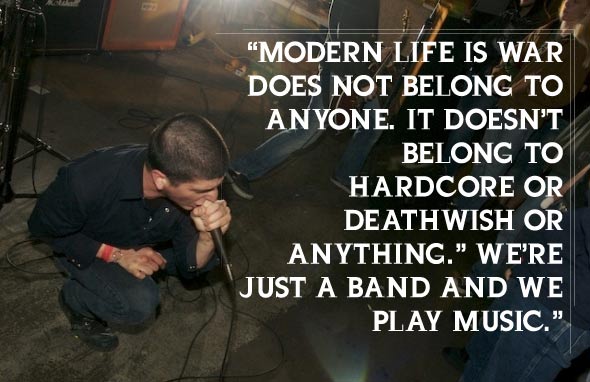
Scene Point Blank: When Witness came out you almost wanted to quit the band because you were aiming for a more traditional punk sound: short, fast, loud. And it wasn't, it had its fast parts but it's mostly mid-tempo. Why didn't you?
Jeff Eaton: My big thing with Witness was when that was starting to be written - my time line might be a little messed up - we started to write it when I was finishing school and then I moved to Minneapolis, I was coming home every other weekend and the band was working every weekend and they would say okay we have this. Songs like "Marshalltown" and "Hair-raising Accounts of Restless Ghosts," and even to an extent "Young Man Blues," I just said, "Don't misunderstand me, I think you're making really cool music, but I can't sing to a five and half minute song that's slow and dramatic. My voice is horrible, I don't have a big metal scream nor can I hit notes. I'm out of my element, I'm sorry but I'll try." At one point I quit and I wrote a few lyrics, like the song I'm not ready I wrote because I thought the band was done. We had a Euro tour planned and I was going to do it and then be done and the guys would find another singer. Then we go into Europe and the first night the old bass player Chris and I went out drinking right away. We got super wasted and super lost and Chris convinced me to stay in the band saying, " We have to do this, we have to make this record. You're the singer of this band. That's the way it is." They had already practiced with another person once. I was frustrated all the way through, trying to write lyrics on the way to Salem [home of God City Studios where Witness was recorded]. I was trying to write lyrics while everyone else was doing the tracking; I was trying to write lyrics when I was doing my tracks. Stuff was just coming out of me. I wasn't sleeping or eating really, I felt like it was a disjointed mess and I was just trying to get through the process of the album that was going to ruin our band.
Scene Point Blank: So how would you compare that to Midnight in America? To me it seems like the most consistently fast Modern Life is War album. It's the most "punk" of the albums.
Jeff Eaton: The thing Midnight in America was that it was such a hard time during Witness for everyone, personally and band wise. We all said that we'd never do that again. No one was happy; no one got along. The process of writing the music, even for those guys without me around, was miserable. Making a record isn't worth a year of that, at all. Matt left and we replaced him with Harm. Chris left and we got Tim.
That was the only record we wrote in the summer time. It was the record we got our own practice space for. I took my stereo and all my vinyl down there. It was in the factory district of Marshalltown, a warehouse with a little room. We had the whole thing to ourselves so we'd just hang out down there and drink beer. Having Harm in the band really lightened up the atmosphere; he isn't as heavy as a person as Matt is.
Scene Point Blank: You mean heavy as in serious?
Jeff Eaton: Yeah. The original lineup: Matt, John, Tyler, Chris and me; I love them all to death but we're all really stubborn and just inside our own minds a lot. We've all known each other forever, which was good, but also really tense. Adding Harm and Tim while also not writing a record in the winter for once really made the atmosphere lighter. We thought, " Let's just have fun and write a really kick ass record."
